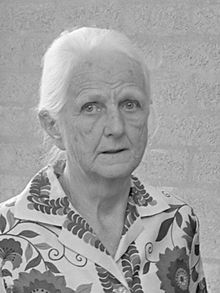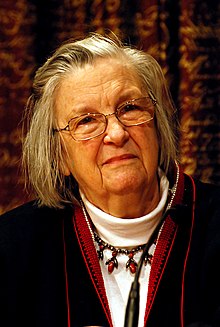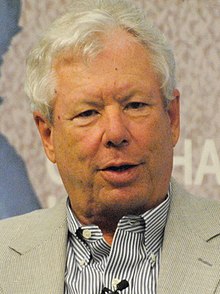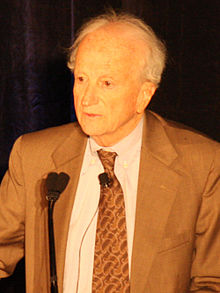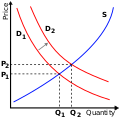Portal:Economics
Portal maintenance status: (December 2018)
|
Introduction
Economics (/ˌɛkəˈnɒmɪks, ˌiːkə-/) is a social science that studies the production, distribution, and consumption of goods and services.
Economics focuses on the behaviour and interactions of economic agents and how economies work. Microeconomics analyses what is viewed as basic elements within economies, including individual agents and markets, their interactions, and the outcomes of interactions. Individual agents may include, for example, households, firms, buyers, and sellers. Macroeconomics analyses economies as systems where production, distribution, consumption, savings, and investment expenditure interact, and factors affecting it: factors of production, such as labour, capital, land, and enterprise, inflation, economic growth, and public policies that have impact on these elements. It also seeks to analyse and describe the global economy. (Full article...)
Selected general articles
-
Image 1This is a list of important publications in economics, organized by field.
Some basic reasons why a particular publication might be regarded as important:- Topic creator – A publication that created a new topic
- Breakthrough – A publication that changed scientific knowledge significantly
- Influence – A publication which has significantly influenced the world or has had a massive impact on the teaching of economics.
-
Image 2Institutional economics focuses on understanding the role of the evolutionary process and the role of institutions in shaping economic behavior. Its original focus lay in Thorstein Veblen's instinct-oriented dichotomy between technology on the one side and the "ceremonial" sphere of society on the other. Its name and core elements trace back to a 1919 American Economic Review article by Walton H. Hamilton. Institutional economics emphasizes a broader study of institutions and views markets as a result of the complex interaction of these various institutions (e.g. individuals, firms, states, social norms). The earlier tradition continues today as a leading heterodox approach to economics.
"Traditional" institutionalism rejects the reduction of institutions to simply tastes, technology, and nature (see naturalistic fallacy). Tastes, along with expectations of the future, habits, and motivations, not only determine the nature of institutions but are limited and shaped by them. If people live and work in institutions on a regular basis, it shapes their world views. Fundamentally, this traditional institutionalism (and its modern counterpart institutionalist political economy) emphasizes the legal foundations of an economy (see John R. Commons) and the evolutionary, habituated, and volitional processes by which institutions are erected and then changed (see John Dewey, Thorstein Veblen, and Daniel Bromley). Institutional economics focuses on learning, bounded rationality, and evolution (rather than assuming stable preferences, rationality and equilibrium). It was a central part of American economics in the first part of the 20th century, including such famous but diverse economists as Thorstein Veblen, Wesley Mitchell, and John R. Commons. Some institutionalists see Karl Marx as belonging to the institutionalist tradition, because he described capitalism as a historically bounded social system; other institutionalist economists[who?] disagree with Marx's definition of capitalism, instead seeing defining features such as markets, money and the private ownership of production as indeed evolving over time, but as a result of the purposive actions of individuals. (Full article...) -
Image 3Supply-side economics is a macroeconomic theory postulating that economic growth can be most effectively fostered by lowering taxes, decreasing regulation, and allowing free trade. According to supply-side economics theory, consumers will benefit from greater supply of goods and services at lower prices, and employment will increase. Supply-side fiscal policies are designed to increase aggregate supply, as opposed to aggregate demand, thereby expanding output and employment while lowering prices. Such policies are of several general varieties:
- Investments in human capital, such as education, healthcare, and encouraging the transfer of technologies and business processes, to improve productivity (output per worker). Encouraging globalized free trade via containerization is a major recent example.
- Tax reduction, to provide incentives to work, invest and take risks. Lowering income tax rates and eliminating or lowering tariffs are examples of such policies.
- Investments in new capital equipment and research and development (R&D), to further improve productivity. Allowing businesses to depreciate capital equipment more rapidly (e.g., over one year as opposed to 10) gives them an immediate financial incentive to invest in such equipment.
- Reduction in government regulations, to encourage business formation and expansion.
A basis of supply-side economics is the Laffer curve, a theoretical relationship between rates of taxation and government revenue. The Laffer curve suggests that when the tax level is too high, lowering tax rates will boost government revenue through higher economic growth, though the level at which rates are deemed "too high" is disputed. A 2012 poll of leading economists found none agreed that reducing the US federal income tax rate would result in higher annual tax revenue within five years. Critics also argue that several large tax cuts in the United States over the last 40 years have not increased revenue. (Full article...) -
Image 4
Joan Violet Robinson FBA (née Maurice; 31 October 1903 – 5 August 1983) was a British economist known for her wide-ranging contributions to economic theory. One of the most prominent economists of the century, Robinson incarnated the "Cambridge School" in most of its guises in the 20th century. She started out as a Marshallian, became one of the earliest and most ardent Keynesians after 1936, and ended up as a leader of the neo-Ricardian and post-Keynesian schools. (Full article...) -
Image 5Modern monetary theory or modern money theory (MMT) is a heterodox macroeconomic theory that describes currency as a public monopoly and unemployment as evidence that a currency monopolist is overly restricting the supply of the financial assets needed to pay taxes and satisfy savings desires. According to MMT, governments do not need to worry about accumulating debt since they can pay interest by printing money. MMT argues that the primary risk once the economy reaches full employment is inflation, which acts as the only constraint on spending. MMT also argues that inflation can be controlled by increasing taxes on everyone, to reduce the spending capacity of the private sector.[verification needed]
MMT is opposed to the mainstream understanding of macroeconomic theory and has been criticized heavily by many mainstream economists. MMT is also strongly opposed by members of the Austrian school of economics, with Murray Rothbard stating that MMT practices are equivalent to "counterfeiting" and that government control of the money supply will inevitably lead to hyperinflation. (Full article...) -
Image 6
Hans-Hermann Hoppe (/ˈhɒpə/; German: [ˈhɔpə]; born 2 September 1949) is a German-American academic associated with Austrian School economics, anarcho-capitalism, right-wing libertarianism, and opposition to democracy. He is professor emeritus of economics at the University of Nevada, Las Vegas (UNLV), senior fellow of the Mises Institute think tank, and the founder and president of the Property and Freedom Society.
Hoppe has written extensively in opposition to democracy, notably in his 2001 book Democracy: The God That Failed. The book favors exclusionary "covenant communities" that are "founded for the purpose of protecting family and kin". A section of the book favoring exclusion of democrats and homosexuals from society helped popularize Hoppe on the far-right. (Full article...) -
Image 7Lithography of List by Josef Kriehuber, 1845
Daniel Friedrich List (6 August 1789 – 30 November 1846) was a German entrepreneur, diplomat, economist and political theorist who developed the nationalist theory of political economy in both Europe and the United States. He was a forefather of the German historical school of economics and argued for the Zollverein (a pan-German customs union) from a nationalist standpoint. He advocated raising tariffs on imported goods while supporting free trade of domestic goods and stated the cost of a tariff should be seen as an investment in a nation's future productivity. His theories and writing also influenced the American school of economics.
List was a political liberal who collaborated with Karl von Rotteck and Carl Theodor Welcker on the Rotteck-Welckersches Staatslexikon [de], an encyclopedia of political science that advocated constitutional liberalism and which influenced the Vormärz. At the time in Europe, liberal and nationalist ideas were almost inseparably linked, and political liberalism was not yet attached to what was later considered "economic liberalism." Emmanuel Todd considers List a forerunner to John Maynard Keynes as a theorist of "moderate or regulated capitalism." (Full article...) -
Image 8
Elinor Claire "Lin" Ostrom (née Awan; August 7, 1933 – June 12, 2012) was an American political scientist and political economist whose work was associated with New Institutional Economics and the resurgence of political economy. In 2009, she was awarded the Nobel Memorial Prize in Economic Sciences for her "analysis of economic governance, especially the commons", which she shared with Oliver E. Williamson; she was the first woman to win the prize.
Trained in political science at UCLA, Ostrom was a faculty member at Indiana University in Bloomington for 47 years. Beginning in the 1960s, Ostrom was involved in resource management policy and created a research center, the Workshop in Political Theory and Policy Analysis, which attracted scientists from different disciplines from around the world. Working and teaching at her center was created on the principle of a workshop, rather than a university with lectures and a strict hierarchy. Late in her career, she held an affiliation with Arizona State University. (Full article...) -
Image 9
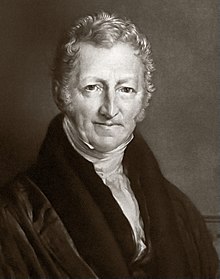
Thomas Robert Malthus, after whom Malthusianism is named
Malthusianism is a theory that population growth is potentially exponential, according to the Malthusian growth model, while the growth of the food supply or other resources is linear, which eventually reduces living standards to the point of triggering a population decline. This event, called a Malthusian catastrophe (also known as a Malthusian trap, population trap, Malthusian check, Malthusian crisis, Point of Crisis, or Malthusian crunch) has been predicted to occur if population growth outpaces agricultural production, thereby causing famine or war. According to this theory, poverty and inequality will increase as the price of assets and scarce commodities goes up due to fierce competition for these dwindling resources. This increased level of poverty eventually causes depopulation by decreasing birth rates. If asset prices keep increasing, social unrest would occur, which would likely cause a major war, revolution, or a famine. Societal collapse is an extreme but possible outcome from this process. The theory posits that such a catastrophe would force the population to "correct" back to a lower, more easily sustainable level (quite rapidly, due to the potential severity and unpredictable results of the mitigating factors involved, as compared to the relatively slow time scales and well-understood processes governing unchecked growth or growth affected by preventive checks). Malthusianism has been linked to a variety of political and social movements, but almost always refers to advocates of population control.
These concepts derive from the political and economic thought of the Reverend Thomas Robert Malthus, as laid out in his 1798 writings, An Essay on the Principle of Population. Malthus suggested that while technological advances could increase a society's supply of resources, such as food, and thereby improve the standard of living, the abundance of resources would enable population growth, which would eventually bring the supply of resources for each person back to its original level. Some economists contend that since the Industrial Revolution in the early 19th century, mankind has broken out of the trap. Others argue that the continuation of extreme poverty indicates that the Malthusian trap continues to operate. Others further argue that due to lack of food availability coupled with excessive pollution, developing countries show more evidence of the trap as compared to developed countries. A similar, more modern concept, is that of human overpopulation. (Full article...) -
Image 10Behavioral economics is the study of the psychological (e.g. cognitive, behavioral, affective, social) factors involved in the decisions of individuals or institutions, and how these decisions deviate from those implied by traditional economic theory.
Behavioral economics is primarily concerned with the bounds of rationality of economic agents. Behavioral models typically integrate insights from psychology, neuroscience and microeconomic theory. (Full article...) -
Image 11Game theory is the study of mathematical models of strategic interactions. It has applications in many fields of social science, and is used extensively in economics, logic, systems science and computer science. Initially, game theory addressed two-person zero-sum games, in which a participant's gains or losses are exactly balanced by the losses and gains of the other participant. In the 1950s, it was extended to the study of non zero-sum games, and was eventually applied to a wide range of behavioral relations. It is now an umbrella term for the science of rational decision making in humans, animals, and computers.
Modern game theory began with the idea of mixed-strategy equilibria in two-person zero-sum games and its proof by John von Neumann. Von Neumann's original proof used the Brouwer fixed-point theorem on continuous mappings into compact convex sets, which became a standard method in game theory and mathematical economics. His paper was followed by Theory of Games and Economic Behavior (1944), co-written with Oskar Morgenstern, which considered cooperative games of several players. The second edition provided an axiomatic theory of expected utility, which allowed mathematical statisticians and economists to treat decision-making under uncertainty. (Full article...) -
Image 12
Joseph Eugene Stiglitz (/ˈstɪɡlɪts/; born February 9, 1943) is an American New Keynesian economist, a public policy analyst, political activist, and a professor at Columbia University. He is a recipient of the Nobel Memorial Prize in Economic Sciences (2001) and the John Bates Clark Medal (1979). He is a former senior vice president and chief economist of the World Bank. He is also a former member and chairman of the US Council of Economic Advisers. He is known for his support for the Georgist public finance theory and for his critical view of the management of globalization, of laissez-faire economists (whom he calls "free-market fundamentalists"), and of international institutions such as the International Monetary Fund and the World Bank.
In 2000, Stiglitz founded the Initiative for Policy Dialogue (IPD), a think tank on international development based at Columbia University. He has been a member of the Columbia faculty since 2001 and received the university's highest academic rank (university professor) in 2003. He was the founding chair of the university's Committee on Global Thought. He also chairs the University of Manchester's Brooks World Poverty Institute. He was a member of the Pontifical Academy of Social Sciences. In 2009, the President of the United Nations General Assembly Miguel d'Escoto Brockmann, appointed Stiglitz as the chairman of the U.N. Commission on Reforms of the International Monetary and Financial System, where he oversaw suggested proposals and commissioned a report on reforming the international monetary and financial system. He served as the chair of the international Commission on the Measurement of Economic Performance and Social Progress, appointed by the French President Sarkozy, which issued its report in 2010, Mismeasuring our Lives: Why GDP doesn't add up, and currently serves as co-chair of its successor, the High Level Expert Group on the Measurement of Economic Performance and Social Progress. From 2011 to 2014, Stiglitz was the president of the International Economic Association (IEA). He presided over the organization of the IEA triennial world congress held near the Dead Sea in Jordan in June 2014. (Full article...) -
Image 13
Tjalling Charles Koopmans (August 28, 1910 – February 26, 1985) was a Dutch-American mathematician and economist. He was the joint winner with Leonid Kantorovich of the 1975 Nobel Memorial Prize in Economic Sciences for his work on the theory of the optimum allocation of resources. Koopmans showed that on the basis of certain efficiency criteria, it is possible to make important deductions concerning optimum price systems. (Full article...) -
Image 14Neoclassical economics is an approach to economics in which the production, consumption, and valuation (pricing) of goods and services are observed as driven by the supply and demand model. According to this line of thought, the value of a good or service is determined through a hypothetical maximization of utility by income-constrained individuals and of profits by firms facing production costs and employing available information and factors of production. This approach has often been justified by appealing to rational choice theory.
Neoclassical economics is the dominant approach to microeconomics and, together with Keynesian economics, formed the neoclassical synthesis which dominated mainstream economics as "neo-Keynesian economics" from the 1950s onward. (Full article...) -
Image 15
James McGill Buchanan Jr. (/bjuːˈkænən/ bew-KAN-ən; October 3, 1919 – January 9, 2013) was an American economist known for his work on public choice theory originally outlined in his most famous work, The Calculus of Consent, co-authored with Gordon Tullock in 1962. He continued to develop the theory, eventually receiving the Nobel Memorial Prize in Economic Sciences in 1986. Buchanan's work initiated research on how politicians' and bureaucrats' self-interest, utility maximization, and other non-wealth-maximizing considerations affect their decision-making. He was a member of the Board of Advisors of The Independent Institute as well as of the Institute of Economic Affairs, a member of the Mont Pelerin Society (MPS) and MPS president from 1984 to 1986, a Distinguished Senior Fellow of the Cato Institute, and professor at George Mason University. (Full article...) -
Image 16The German historical school of economics. was an approach to academic economics and to public administration that emerged in the 19th century in Germany, and held sway there until well into the 20th century. The professors involved compiled massive economic histories of Germany and Europe. Numerous Americans were their students. The school was opposed by theoretical economists. Prominent leaders included Gustav von Schmoller (1838–1917), and Max Weber (1864–1920) in Germany, and Joseph Schumpeter (1883–1950) in Austria and the United States. (Full article...)
-
Image 17

Ludwig Heinrich Edler von Mises (German: [ˈluːtvɪç fɔn ˈmiːzəs]; 29 September 1881 – 10 October 1973) was an Austrian-American economist, logician, sociologist and philosopher of economics of the Austrian school. Mises wrote and lectured extensively on the societal contributions of classical liberalism and the power of consumers. He is best known for his work in praxeology, particularly for studies comparing communism and capitalism, as well as for being a defender of classical liberalism in the face of rising illiberalism and authoritarianism throughout much of Europe during the 20th century.
Mises emigrated from Austria to the United States in 1940, fleeing from Nazis who on the first day the German Army entered Vienna rushed into the von Mises apartment in Vienna, apparently looking for him, and confiscated his library and papers. Mises was in Geneva, Switzerland at the time, but when the German invasion of France was about to leave Switzerland completely surrounded by Fascist and Nazi controlled territory, von Mises and his wife found it necessary to flee through France dodging German troops, to get to the US via Spain and Portugal. Since the mid-20th century, both libertarian movements and the field of economics as a whole, have been strongly influenced by Mises's writings. Mises's student Friedrich Hayek viewed Mises as one of the major figures in the revival of classical liberalism in the post-war era. Hayek's work The Transmission of the Ideals of Freedom (1951) pays high tribute to the influence of Mises in the 20th-century libertarian movement. Economist Tyler Cowen lists his writings as "the most important works of the 20th century" and as "among the most important economics articles, ever". (Full article...) -
Image 18Complexity economics is the application of complexity science to the problems of economics. It relaxes several common assumptions in economics, including general equilibrium theory. While it does not reject the existence of an equilibrium, it features an non-equilibrium approach and sees such equilibria as a special case and as an emergent property resulting from complex interactions between economic agents. The complexity science approach has also been applied to computational economics. (Full article...)
-
Image 19Frank Hyneman Knight (November 7, 1885 – April 15, 1972) was an American economist who spent most of his career at the University of Chicago, where he became one of the founders of the Chicago School.
Nobel laureates Milton Friedman, George Stigler and James M. Buchanan were all students of Knight at Chicago. Ronald Coase said that Knight, without teaching him, was a major influence on his thinking. F.A. Hayek considered Knight to be one of the major figures in preserving and promoting classical liberal thought in the twentieth century. (Full article...) -
Image 20Real business-cycle theory (RBC theory) is a class of new classical macroeconomics models in which business-cycle fluctuations are accounted for by real, in contrast to nominal, shocks. RBC theory sees business cycle fluctuations as the efficient response to exogenous changes in the real economic environment. That is, the level of national output necessarily maximizes expected utility.
In RBC models, business cycles are described as "real" because they reflect optimal adjustments by economic agents rather than failures of markets to clear. As a result, RBC theory suggests that governments should concentrate on long-term structural change rather than intervention through discretionary fiscal or monetary policy. These ideas are strongly associated with freshwater economics within the neoclassical economics tradition, particularly the Chicago School of Economics. (Full article...) -
Image 21Mutualism is an anarchist school of thought and anti-capitalist market socialist economic theory that advocates for workers' control of the means of production, a market economy made up of individual artisans and workers' cooperatives, and occupation and use property rights. As proponents of the labour theory of value and labour theory of property, mutualists oppose all forms of economic rent, profit and non-nominal interest, which they see as relying on the exploitation of labour. Mutualists seek to construct an economy without capital accumulation or concentration of land ownership. They also encourage the establishment of workers' self-management, which they propose could be supported through the issuance of mutual credit by mutual banks, with the aim of creating a federal society.
Mutualism has its roots in the utopian socialism of Robert Owen and Charles Fourier. It first developed a practical expression in Josiah Warren's community experiments in the United States, which he established according to the principles of equitable commerce based on a system of labor notes. Mutualism was first formulated into a comprehensive economic theory by the French anarchist Pierre-Joseph Proudhon, who proposed the abolition of unequal exchange and the establishment of a new economic system based on reciprocity. In order to establish such a system, he proposed the creation of a "People's Bank" that could issue mutual credit to workers and eventually replace the state; although his own attempts to establish such a system were foiled by the 1851 French coup d'état. (Full article...) -
Image 22
Richard H. Thaler (/ˈθeɪlər/; born September 12, 1945) is an American economist and the Charles R. Walgreen Distinguished Service Professor of Behavioral Science and Economics at the University of Chicago Booth School of Business. In 2015, Thaler was president of the American Economic Association.
Thaler is a theorist in behavioral economics who has collaborated with Daniel Kahneman, Amos Tversky, and others in further defining that field. In 2018, he was elected a member in the National Academy of Sciences. (Full article...) -
Image 23
Gary Stanley Becker (/ˈbɛkər/; December 2, 1930 – May 3, 2014) was an American economist who received the 1992 Nobel Memorial Prize in Economic Sciences. He was a professor of economics and sociology at the University of Chicago, and was a leader of the third generation of the Chicago school of economics.
Becker was awarded the Nobel Memorial Prize in Economic Sciences in 1992 and received the United States Presidential Medal of Freedom in 2007. A 2011 survey of economics professors named Becker their favorite living economist over the age of 60, followed by Kenneth Arrow and Robert Solow. Economist Justin Wolfers called him "the most important social scientist in the past 50 years." (Full article...) -
Image 24
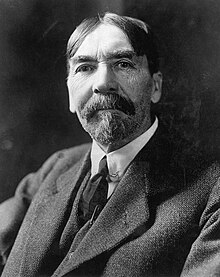
Thorstein Bunde Veblen (July 30, 1857 – August 3, 1929) was an American economist and sociologist who, during his lifetime, emerged as a well-known critic of capitalism.
In his best-known book, The Theory of the Leisure Class (1899), Veblen coined the concepts of conspicuous consumption and conspicuous leisure. Veblen laid the foundation for the perspective of the institutional economics. Contemporary economists still theorize Veblen's distinction between "institutions" and "technology", known as the Veblenian dichotomy. (Full article...) -
Image 25
Ragnar Anton Kittil Frisch (3 March 1895 – 31 January 1973) was an influential Norwegian economist known for being one of the major contributors to establishing economics as a quantitative and statistically informed science in the early 20th century. He coined the term econometrics in 1926 for utilising statistical methods to describe economic systems, as well as the terms microeconomics and macroeconomics in 1933, for describing individual and aggregate economic systems, respectively. He was the first to develop a statistically informed model of business cycles in 1933. Later work on the model, together with Jan Tinbergen, won the first Nobel Memorial Prize in Economic Sciences in 1969.
Frisch became dr.philos. with a thesis on mathematics and statistics at the University of Oslo in 1926. After his doctoral thesis, he spent five years researching in the United States at the University of Minnesota and Yale University. After teaching briefly at Yale from 1930–31, he was offered a full professorship in economics, which he declined after pressures by colleagues to return to the University of Oslo. After returning to Oslo, Frisch was first appointed by the King-in-Council as Professor of Economics and Statistics at the Faculty of Law, University of Oslo (then the Royal Frederick University) in 1931, before becoming leader of the newly founded Institute of Economics at the University of Oslo in 1932. He remained at the University of Oslo until his retirement in 1965. (Full article...)
Did you know...
- ... that Michael Kremer's O-ring theory of economic development was inspired by his forgetting to purchase toilet paper for a training session?
- ... that the petunia carnage of 2017 led to worldwide economic losses?
- ... that developmental economist Michael Lipton showed that poor farmers were more resource efficient than rich farmers?
- ... that Ruth Huenemann was one of the first researchers to make a connection between socioeconomic status and childhood obesity?
- ... that people are robbing Lebanese banks to get their own money back?
- ... that Eleanor Hadley, a 29-year-old doctoral candidate in economics, was recruited by the Supreme Commander for the Allied Powers to implement antitrust policies in occupied Japan?
Need help?
Do you have a question about Economics that you can't find the answer to?
Consider asking it at the Wikipedia reference desk.
Get involved
For editor resources and to collaborate with other editors on improving Wikipedia's Economics-related articles, see WikiProject Economics.
Selected images
-
Image 1The Marxist critique of political economy comes from the work of German philosopher Karl Marx.
-
Image 4An environmental scientist sampling water
-
Image 6The publication of Adam Smith's The Wealth of Nations in 1776 is considered to be the first formalisation of economic thought.
-
Image 7São Paulo Stock Exchange in Brazil, an electronic trading network that brings together buyers and sellers through an electronic trading platform
-
Image 8The supply and demand model describes how prices vary as a result of a balance between product availability and demand. The graph depicts an increase in demand from D1 to D2 and the resulting increase in price and quantity required to reach a new equilibrium point on the supply curve (S).
-
Image 11Economists study trade, production, and consumption decisions, including those that occur in a traditional marketplace
-
Image 12A 1638 painting of a French seaport during the heyday of mercantilism
-
Image 14Pollution can be a simple example of market failure; if costs of production are not borne by producers but are by the environment, accident victims or others, then prices are distorted.
In the news
- 18 December 2024 – 2024 Georgian presidential election, 2024 Georgian parliamentary election, 2024 Georgian post-election protests
- In an address to the European Parliament, Georgian President Salome Zourabichvili urges the European Union to economically and politically pressure the current Georgian government into holding new elections, claiming that recent elections represented a "new form of invasion" by Russia. (Euronews) (AP)
- 5 December 2024 – German economic crisis
- German workers' union IG Metall announces they will go on extended strikes next week leading up to a fourth round of negotiations with Volkswagen. (DW)
- 2 December 2024 – German economic crisis
- Workers of the German metalworkers' union IG Metall begin a labor strike after failed negotiations with Volkswagen following the closure of three automotive manufacturing plants. (DW)
- 26 November 2024 – 2021–present United Kingdom cost-of-living crisis
- Multinational car manufacturing company Stellantis announces that it will close its van-production factory in Luton, England, putting 1,100 jobs at risk, citing the UK's economic conditions and the government's zero-emission vehicle (ZEV) mandate as reasons for its closure. (The Guardian)
- 25 November 2024 – German economic crisis
- Germany's largest steelmaker conglomerate, ThyssenKrupp, announces plans to layoff 11,000 workers, including 5,000 in Europe, by 2030. (DW)
- 25 November 2024 –
- Nine migrants, including six children, are killed and 39 others are rescued from a shipwreck off the coast of Samos, Greece. (Al Jazeera) (The Express Tribune)
Subcategories
Subtopics
Associated Wikimedia
The following Wikimedia Foundation sister projects provide more on this subject:
-
Commons
Free media repository -
Wikibooks
Free textbooks and manuals -
Wikidata
Free knowledge base -
Wikinews
Free-content news -
Wikiquote
Collection of quotations -
Wikisource
Free-content library -
Wikiversity
Free learning tools -
Wiktionary
Dictionary and thesaurus


